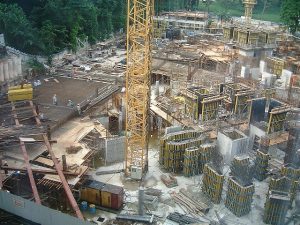QC exemption will effectively remove the double whammy effect to some developers that have to contend with both the QC as well as the ABSD regimes, says CBRE

On 6th February 2020, the Ministry of Law and Singapore Land Authority announced that the exemption of publicly listed housing developers with a substantial connection to Singapore from the Qualifying Certificate (QC) regime will be allowed.
Under the Residential Property Act (RPA), any housing developer that is not considered a Singapore company has to apply for a QC when it purchases residential land for development, other than from the government. Under the QC regime, it is required to complete the development within five years and dispose of all units within two years of completion. The extension charge payable for an extension of time is: 8% of the purchase price of the land for the first year extension, 16% for the second year of extension and 24% for the third and subsequent years. The number of unsold units will be taken into consideration when computing the charge. This is to ensure that such housing developers build and sell the residential units in a timely manner, and do not hoard and speculate in residential land.
A housing developer that is a Singapore company is not subject to the QC regime. Currently, a Singapore company is defined in the RPA as one that is incorporated in Singapore, and all its directors and shareholders are Singapore citizens or Singapore companies. This definition however means that publicly listed housing developers that are essentially Singaporean will not be considered a Singapore company. If they have one foreign shareholder, they will not be considered a Singapore company.
Publicly listed housing developers can apply for QC exemption on the basis that they have a substantial connection to Singapore.
Table of Contents
The QC exemption application will be assessed by reference to the following criteria:
1. Incorporation in Singapore;
2. Primary listing is on the Singapore Exchange and principal place of business is Singapore;
3. The chairperson and the majority of the company’s board are Singapore citizens;
4. A significantly Singaporean substantial shareholding interest in the company; and
5. Track record in Singapore.
The QC exemption changes will be implemented with immediate effect and reflected in legislation later this year.
The government is making no changes to the existing property market cooling measures, which were put in place to keep private residential property price increases in line with economic fundamentals. In particular, all housing developers continue to be subject to the prevailing Additional Buyer’s Stamp Duty (ABSD) regime. The regime requires, among other conditions, developers to sell all units in a residential project within a specified timeline, failing which they will be subject to the ABSD.
CBRE Research’s Views on QC Exemption
“This exemption will effectively remove the double whammy effect to some developers that have to contend with both the QC as well as the ABSD regimes. Successful applicants of the exemption of the QC regime will still have to ensure that all units in their residential projects are sold within a specified timeline under the overarching ABSD regime. Going forward, as such listed companies may not be categorised as a foreign entity following a successful application, some of these listed developers will be given a respite to continue to participate in the acquisition of land in the near to mid term.
“This is a clear indicator that the government is constantly monitoring and fine tuning its policies. This policy further strengthens their support for local developers, as it is difficult to qualify listed developers as a 100% Singapore company.”
How to apply for a Qualifying Certificate?
You are required to submit an online application. A non-refundable fee is payable.
Who can apply for a Qualifying Certificate (QC)?
A housing developer who intends to purchase restricted property to construct flats or dwelling house for sale.
A housing developer means:
- (a) an individual who is not a Singapore citizen; or
- a foreign company, a foreign limited liability partnership or a foreign society; or
- a Singapore company, limited liability partnership or society which is not holding a clearance certificate.
What are the conditions attached to a QC?
- Complete the construction and obtain the Temporary Occupation Permit or Certificate of Statutory Completion within 5 years from the date of issue of the QC or the collective sale order, whichever is applicable;
- Dispose of all the residential units within 2 years from the date of issue of the Temporary Occupation Permit or Certificate of Statutory Completion, whichever is earlier;
- Must not, without approval, change the shareholding of the housing developer after QC is issued;
- Must not, without approval, sell the land in its vacant or undeveloped state; and
- Provide security (Banker’s Guarantee of at least 10% of purchase price of land).
What if the housing developer is not able to complete the housing development within the 5-year period?
It is required to submit an online application for variation of condition for an extension of time to complete the housing development. A non-refundable application fee is payable. The extension charge payable for an extension of time is – 8% of the purchase price of the land for the first year extension, 16% for the second year of extension and 24% for the third and subsequent years.
What if the housing developer is not able to sell all the units in the development within the 2-year period?
It is required to submit an online application for variation of condition for an extension of time to dispose of the units in the development. A non-refundable application fee is payable. The extension charge payable for an extension of time is – 8% of the purchase price of the land for the first year extension, 16% for the second year of extension and 24% for the third and subsequent years. The number of unsold units will be taken into consideration when computing the charge.






